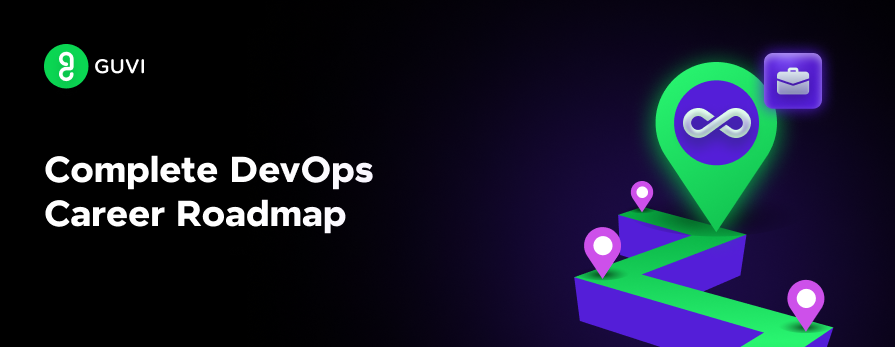
Complete DevOps Career Roadmap: A Comprehensive Guide
May 08, 2025 8 Min Read 6561 Views
(Last Updated)
DevOps has become an essential practice for organizations looking to streamline their software development and deployment processes. As a result, DevOps professionals are in high demand, making it an attractive career path for many in the IT industry.
In this comprehensive guide, we will walk you through the complete DevOps career roadmap, from beginner to expert level, helping you understand your journey to becoming a successful DevOps professional.
Table of contents
- What is DevOps?
- Complete DevOps Career Roadmap
- Foundational Skills
- Essential Tools and Technologies
- Advanced DevOps Practices
- Specializations in DevOps
- Soft Skills for DevOps Professionals
- Career Progression in DevOps
- Entry-Level Positions
- Mid-Level Positions
- Senior-Level Positions
- Leadership Positions
- Certifications and Continuous Learning
- DevOps Certifications
- Cloud Platform Certifications
- Continuous Learning Resources
- Future Trends in DevOps
- Conclusion
- FAQs
- What skills do I need to start a DevOps career?
- What are the typical job roles available in a DevOps career?
- How long does it take to become a DevOps professional?
- Do I need to have a software development background to pursue DevOps?
- What certifications should I pursue to boost my DevOps career?
What is DevOps?
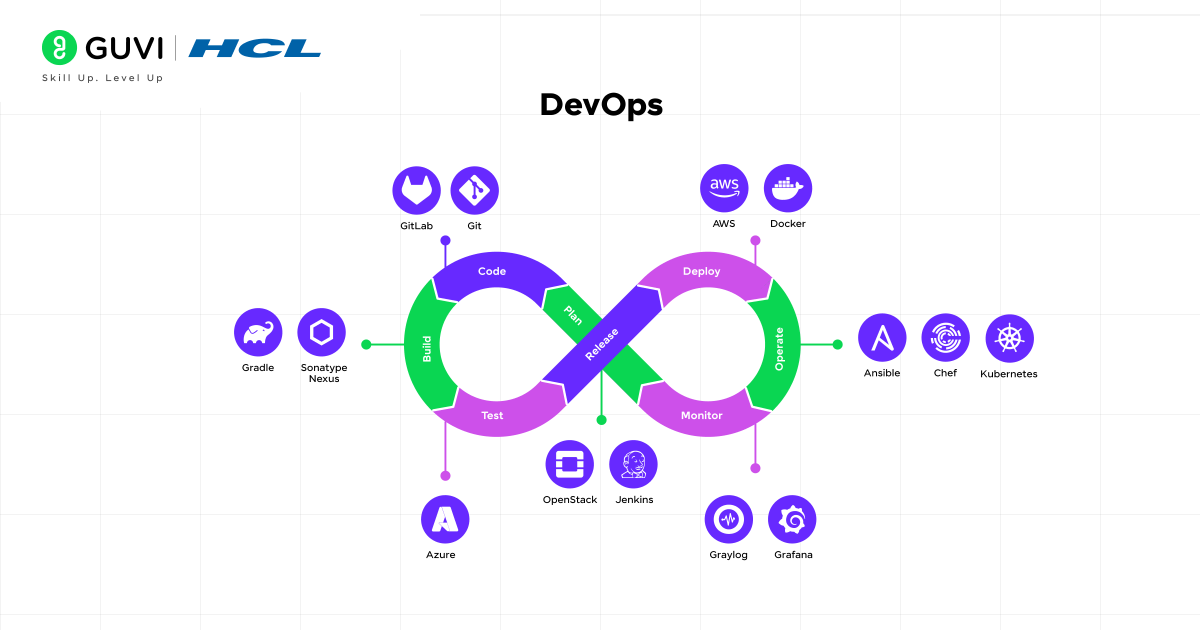
DevOps, a portmanteau of “Development” and “Operations,” is a set of practices that combines software development (Dev) and IT operations (Ops). It aims to shorten the systems development life cycle and provide continuous delivery with high software quality. DevOps is complementary to Agile software development; several DevOps aspects came from the Agile methodology.
Key Principles of DevOps:
- Collaboration: Fostering a culture of shared responsibility between development and operations teams.
- Automation: Streamlining repetitive tasks to improve efficiency and reduce errors.
- Continuous Integration and Continuous Delivery (CI/CD): Frequently integrating code changes and deploying to production.
- Monitoring and Feedback: Continuously monitoring applications and infrastructure to gather insights and improve processes.
Understanding these principles is crucial for anyone starting a career in DevOps. As you progress through your career, you’ll dive deeper into each of these areas and learn how to implement them effectively in various organizational contexts.
Complete DevOps Career Roadmap
The following roadmap will guide you through the essential steps, DevOps tools, and competencies needed to become a successful DevOps professional, from foundational knowledge to advanced strategies for continuous integration, deployment, and automation.
1. Foundational Skills
Before diving into DevOps-specific skills, it’s essential to have a strong foundation in general IT and software development concepts. These foundational skills will serve as the building blocks for your DevOps career.
a. Programming and Scripting
- Learn at least one programming language (e.g., Python, Java, or Go)
- Master shell scripting (Bash, PowerShell)
- Understand basic algorithms and data structures
b. Operating Systems
- Gain proficiency in Linux administration
- Familiarize yourself with Windows Server environments
- Understand process management, file systems, and networking basics
c. Networking
- Learn TCP/IP fundamentals
- Understand DNS, DHCP, and other networking protocols
- Familiarize yourself with network security principles
d. Version Control
- Master Git for source code management
- Understand branching strategies and collaborative workflows
e. Basic Cloud Computing Concepts
- Familiarize yourself with major cloud providers (AWS, Azure, GCP)
- Understand Infrastructure as a Service (IaaS) and Platform as a Service (PaaS) concepts
These foundational skills will provide you with the necessary background to understand and implement DevOps practices effectively. As you progress in your career, you’ll build upon these skills and apply them in more complex scenarios.
You can consider enrolling yourself in GUVI’s DevOps Course, which lets you gain practical experience by developing real-world projects and covers technologies including Agile, Scrum, Linux, Git, Bash Scripting, Dockers, Containers, AWS infrastructure, etc.
2. Core DevOps Concepts
Once you have a solid foundation, it’s time to delve into the core concepts that define DevOps practices. Understanding these concepts is crucial for implementing DevOps effectively in any organization.
a. Continuous Integration (CI) & Continuous Delivery (CD)
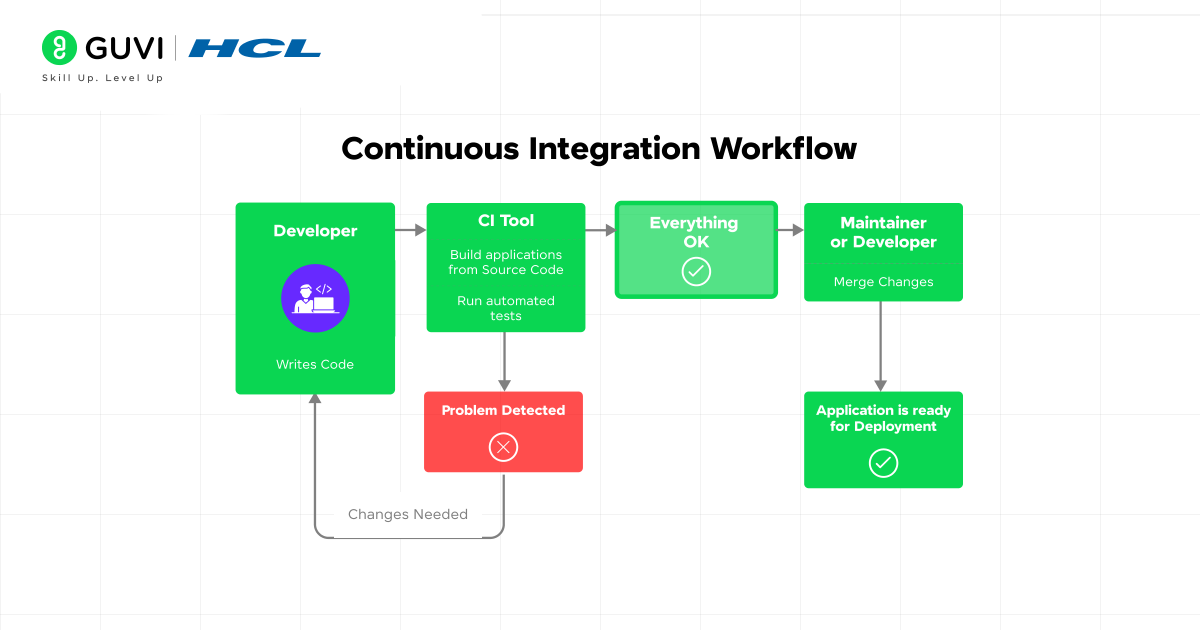
CI is the practice of frequently integrating code changes into a shared repository, ensuring that code is automatically built and tested to catch integration issues early. CD takes it a step further, automating the deployment of code changes to testing or production environments after the build stage, ensuring smooth delivery and deployment.
Key Aspects:
- Automated Build Processes: Automatically compile code after each commit.
- Frequent Code Commits: Regularly merge changes to prevent integration conflicts.
- Automated Testing: Run unit and integration tests to validate code quality.
- Quick Feedback: Immediate alerts for any issues in the codebase.
b. Infrastructure as Code (IaC)
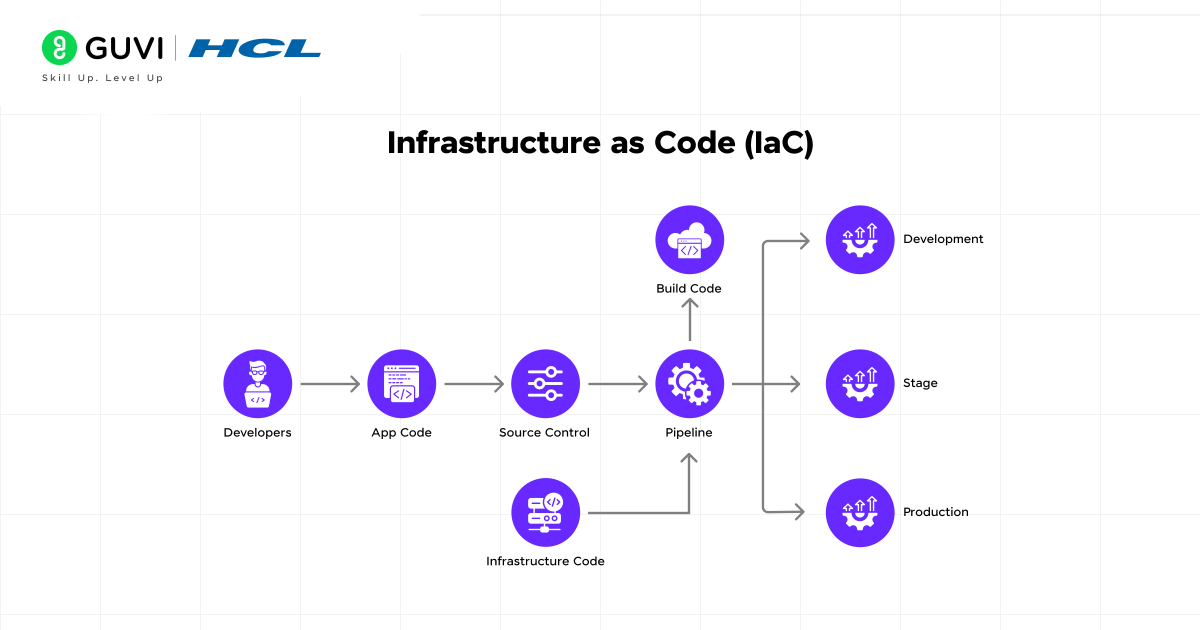
IaC is the practice of managing and provisioning computing infrastructure through machine-readable definition files, rather than physical hardware configuration or interactive configuration tools.
Core concepts of IaC:
- Declarative vs. imperative approaches
- Version control for infrastructure
- Idempotency and consistency
- Popular tools: Terraform, Ansible, CloudFormation
c. Microservices Architecture
Microservices is an architectural style that structures an application as a collection of loosely coupled services. This approach aligns well with DevOps practices.
Key principles of microservices:
- Service independence
- Decentralized data management
- Design for failure
- Automated deployment
d. Containerization
Containerization involves encapsulating an application and its dependencies into a container that can run on any computing environment.
Essential containerization concepts:
- Container images and registries
- Container orchestration (e.g., Kubernetes)
- Container security
- Stateful vs. stateless containers
e. Monitoring and Logging
Effective monitoring and logging are crucial for maintaining system health and troubleshooting issues in a DevOps environment.
Important aspects:
- Application performance monitoring (APM)
- Infrastructure monitoring
- Log aggregation and analysis
- Alerting and incident response
f. Configuration Management
Configuration management ensures that systems are in a desired, consistent state and helps manage changes to system configuration in a systematic way.
Key elements:
- Configuration as code
- State management
- Idempotency
- Popular tools: Ansible, Puppet, Chef
Understanding these core DevOps concepts will provide you with the knowledge needed to implement and improve DevOps practices in various organizational contexts. As you progress in your career, you’ll gain hands-on experience with these concepts and learn how to apply them effectively to solve real-world problems.
3. Essential Tools and Technologies
DevOps professionals rely on a wide range of tools and technologies to implement DevOps practices effectively. Familiarizing yourself with these tools is crucial for success in your DevOps career.
a. Version Control Systems
- Git: The most widely used distributed version control system
- GitHub/GitLab/Bitbucket: Platforms for hosting and collaborating on Git repositories
b. CI/CD Tools
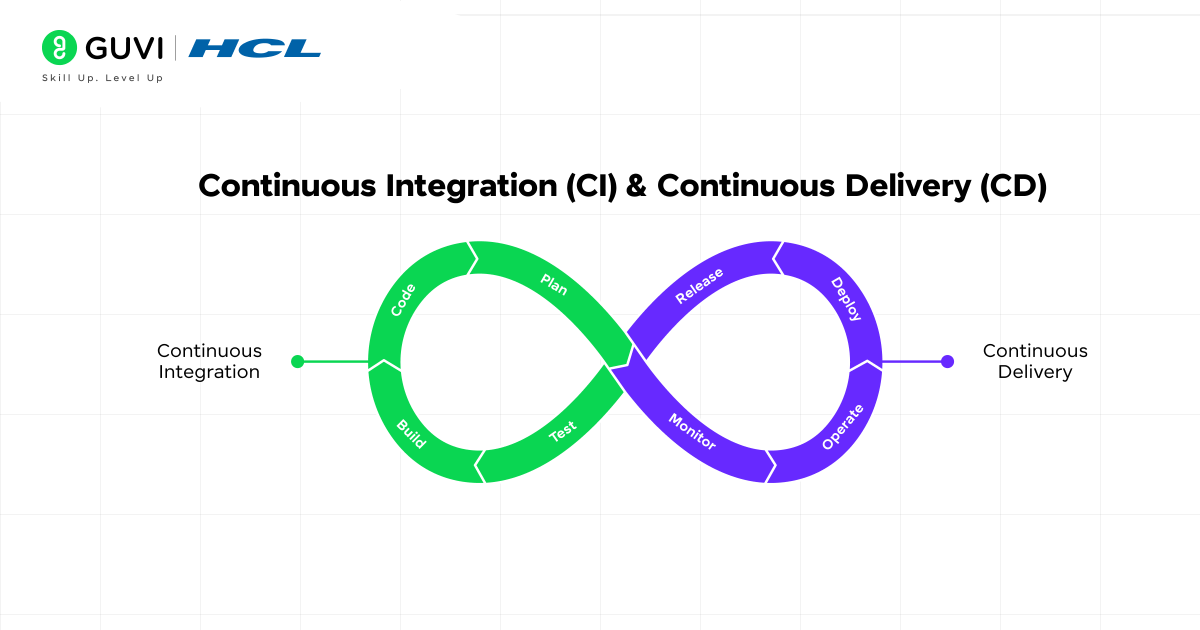
- Jenkins: Open-source automation server for building, deploying, and automating projects
- GitLab CI: Integrated CI/CD platform within GitLab
- CircleCI: Cloud-based CI/CD platform
- Travis CI: Distributed continuous integration service for open source and private projects
c. Configuration Management Tools
- Ansible: Simple, agentless automation tool
- Puppet: Configuration management tool for centralizing and automating configuration management
- Chef: Powerful automation platform that transforms infrastructure into code
d. Containerization and Orchestration
- Docker: Platform for developing, shipping, and running applications in containers
- Kubernetes: Container orchestration platform for automating deployment, scaling, and management of containerized applications
- Docker Swarm: Native clustering and scheduling tool for Docker
e. Infrastructure as Code Tools
- Terraform: Open-source tool for provisioning and managing cloud infrastructure
- AWS CloudFormation: Amazon Web Services’ native IaC service
- Azure Resource Manager: Microsoft Azure’s native IaC service
f. Monitoring and Logging Tools
- Prometheus: Open-source monitoring and alerting toolkit
- Grafana: Open-source platform for monitoring and observability
- ELK Stack (Elasticsearch, Logstash, Kibana): Popular log management and analytics suite
- Datadog: Cloud-based monitoring and analytics platform
g. Cloud Platforms
- Amazon Web Services (AWS): Leading cloud computing platform
- Microsoft Azure: Microsoft’s cloud computing platform
- Google Cloud Platform (GCP): Google’s suite of cloud computing services
4. Advanced DevOps Practices
As you progress in your DevOps career, you’ll encounter more advanced practices that build upon the core concepts. These practices help organizations achieve higher levels of efficiency, scalability, and reliability.
a. Site Reliability Engineering (SRE)
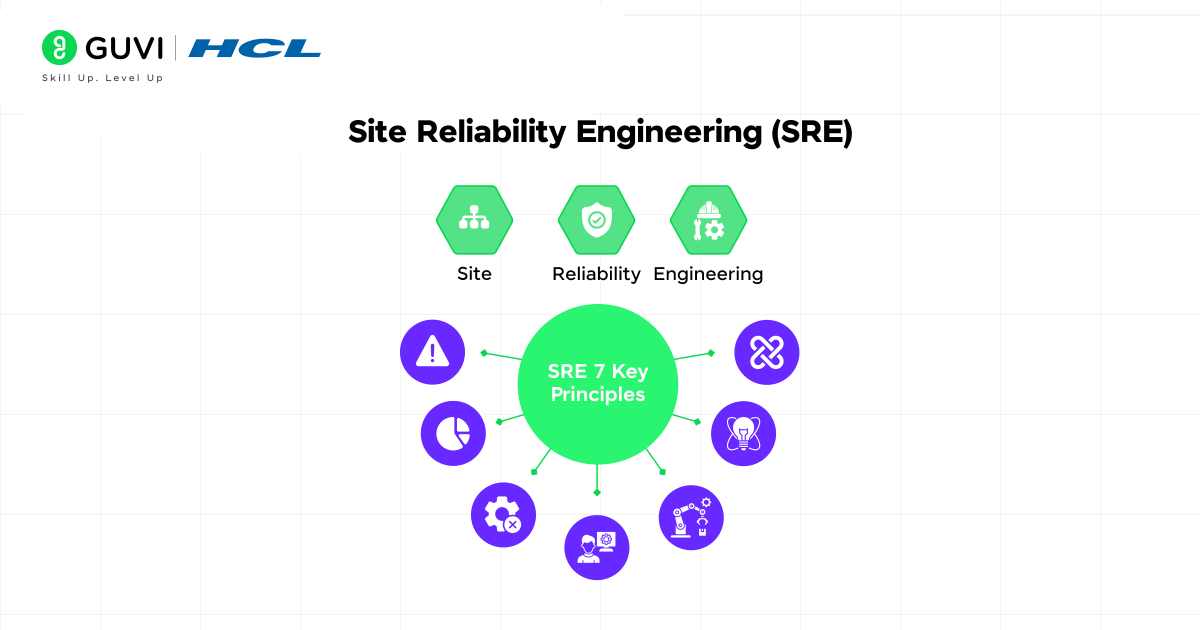
SRE is a discipline that incorporates aspects of software engineering and applies them to infrastructure and operations problems. The main goal is to create scalable and highly reliable software systems.
Key SRE practices:
- Establishing and tracking Service Level Objectives (SLOs)
- Implementing error budgets
- Automating toil (repetitive, manual work)
- Designing for scalability and reliability
b. GitOps
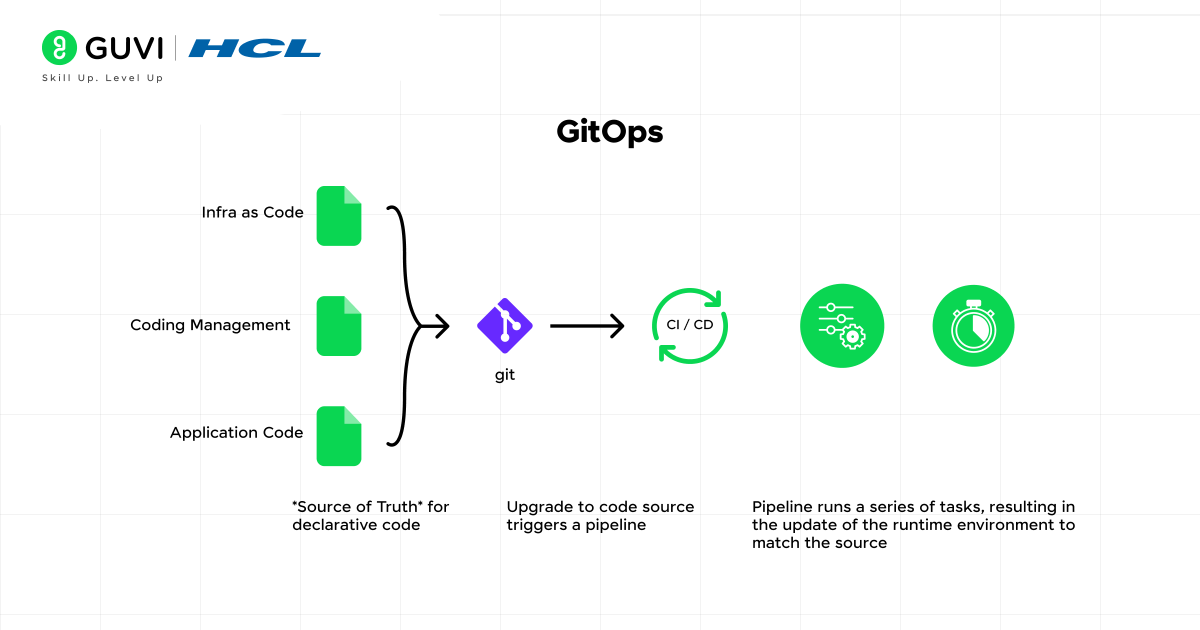
GitOps is a way of implementing Continuous Deployment for cloud-native applications. It focuses on using Git as a single source of truth for declarative infrastructure and applications.
Core principles of GitOps:
- Declarative description of the desired state in Git
- Automated synchronization of the declared state with the running system
- Continuous deployment and verification
c. DevSecOps
DevSecOps integrates security practices within the DevOps process, aiming to create a ‘security as code’ culture with ongoing, flexible collaboration between release engineers and security teams.
Key aspects of DevSecOps:
- Shifting security left (earlier in the development process)
- Automated security testing in CI/CD pipelines
- Continuous security monitoring
- Compliance as code
d. AIOps (Artificial Intelligence for IT Operations)
AIOps platforms utilize big data, modern machine learning and other advanced analytics technologies to directly and indirectly enhance IT operations.
Key capabilities of AIOps:
- Anomaly detection and noise reduction
- Event correlation and analysis
- Automated root cause analysis
- Predictive analytics
e. Multi-Cloud and Hybrid Cloud Strategies
As organizations adopt cloud technologies, managing multi-cloud and hybrid cloud environments becomes crucial.
Key considerations:
- Cloud service interoperability
- Data portability
- Consistent security and governance across clouds
- Cost optimization across multiple cloud providers
f. Serverless Computing
Serverless computing allows you to build and run applications and services without thinking about servers. It eliminates infrastructure management tasks like server or cluster provisioning, patching, operating system maintenance, and capacity provisioning.
Important serverless concepts:
- Function as a Service (FaaS)
- Event-driven architecture
- Pay-per-execution model
- Serverless frameworks (e.g., AWS Lambda, Azure Functions)
5. Specializations in DevOps
As the DevOps field matures, various specializations have emerged, allowing professionals to focus on specific areas within the broader DevOps landscape. These specializations can help you carve out a niche for yourself and become an expert in a particular domain.
a. Cloud DevOps
Focus on implementing DevOps practices specifically for cloud environments.
Key skills:
- Expertise in major cloud platforms (AWS, Azure, GCP)
- Cloud-native application development
- Serverless architectures
- Cloud cost optimization
b. Security DevOps (DevSecOps)
Specialize in integrating security practices into the DevOps workflow.
Important areas:
- Application security
- Infrastructure security
- Compliance and regulatory requirements
- Automated security testing and monitoring
c. AI/ML DevOps (MLOps)
Apply DevOps principles to machine learning and artificial intelligence projects.
Key concepts:
- ML model versioning
- Automated model training and deployment
- Model monitoring and retraining
- Data pipeline management
d. Database DevOps (DataOps)
Specialize in applying DevOps practices to database management and data-intensive applications.
Key areas:
- Database version control
- Automated database deployments
- Data migration strategies
- Database performance optimization
e. DevOps for IoT
Specialize in implementing DevOps practices for Internet of Things (IoT) projects.
Key considerations:
- Edge computing
- Over-the-air (OTA) updates
- IoT device management
- IoT data processing and analytics
6. Soft Skills for DevOps Professionals
While technical skills are crucial in DevOps, soft skills are equally important for success in this field. DevOps is as much about culture and collaboration as it is about tools and technologies. Here are some essential soft skills that every DevOps professional should develop:
a. Communication
Effective communication is vital in DevOps, as it involves constant interaction between development, operations, and other stakeholders.
Key aspects:
- Clear and concise verbal and written communication
- Ability to explain technical concepts to non-technical stakeholders
- Active listening
- Presentation skills
b. Collaboration and Teamwork
DevOps is inherently collaborative, requiring professionals to work effectively in cross-functional teams.
Important skills:
- Building and maintaining relationships across teams
- Fostering a culture of shared responsibility
- Conflict resolution
- Giving and receiving constructive feedback
c. Problem-Solving and Critical Thinking
DevOps professionals often face complex problems that require innovative solutions.
Key abilities:
- Analytical thinking
- Root cause analysis
- Ability to break down complex problems into manageable parts
- Creative problem-solving
d. Time Management and Prioritization
DevOps professionals often juggle multiple projects and responsibilities, making effective time management crucial.
Key skills:
- Prioritizing tasks based on business impact
- Managing competing deadlines
- Effective multitasking
- Avoiding burnout through proper work-life balance
Developing these soft skills alongside your technical expertise will make you a well-rounded DevOps professional, capable of driving cultural change and fostering collaboration across your organization.
Career Progression in DevOps
A career in DevOps offers numerous opportunities for growth and advancement. Here’s an overview of typical career progression in the DevOps field:
Entry-Level Positions
- Junior DevOps Engineer
- Responsibilities: Assisting with basic infrastructure tasks, writing simple scripts, and learning the CI/CD pipeline.
- Required Skills: Basic programming, understanding of Linux systems, familiarity with version control.
- Average Salary: ₹3,50,000 – ₹5,00,000 per annum
- Cloud Support Associate
- Responsibilities: Providing technical support for cloud services, assisting with cloud migrations.
- Required Skills: Knowledge of major cloud platforms, basic troubleshooting skills.
- Average Salary: ₹4,00,000 – ₹6,00,000 per annum
Mid-Level Positions
- DevOps Engineer
- Responsibilities: Implementing and maintaining CI/CD pipelines, managing infrastructure, automating processes.
- Required Skills: Proficiency in scripting languages, experience with CI/CD tools, container technologies.
- Average Salary: ₹7,00,000 – ₹12,00,000 per annum
- Site Reliability Engineer (SRE)
- Responsibilities: Ensuring system reliability and performance, implementing monitoring solutions.
- Required Skills: Strong coding abilities, deep understanding of system architecture, expertise in monitoring tools.
- Average Salary: ₹8,00,000 – ₹15,00,000 per annum
- Cloud DevOps Specialist
- Responsibilities: Designing and implementing cloud-native solutions, optimizing cloud resources.
- Required Skills: Advanced knowledge of cloud platforms, expertise in IaC, understanding of cloud security best practices.
- Average Salary: ₹10,00,000 – ₹18,00,000 per annum
Senior-Level Positions
- Senior DevOps Engineer
- Responsibilities: Leading DevOps initiatives, mentoring junior team members, architecting complex systems.
- Required Skills: Expert-level knowledge of DevOps tools and practices, strong leadership abilities.
- Average Salary: ₹15,00,000 – ₹25,00,000 per annum
- DevOps Architect
- Responsibilities: Designing overall DevOps strategy, selecting tools and technologies, ensuring best practices.
- Required Skills: Broad and deep technical knowledge, strategic thinking, excellent communication skills.
- Average Salary: ₹20,00,000 – ₹35,00,000 per annum
- Cloud Architect
- Responsibilities: Designing and overseeing implementation of cloud strategies, ensuring scalability and security.
- Required Skills: Expert-level knowledge of cloud technologies, understanding of business requirements, ability to create long-term technical vision.
- Average Salary: ₹22,00,000 – ₹40,00,000 per annum
Leadership Positions
- DevOps Manager
- Responsibilities: Managing DevOps teams, aligning DevOps initiatives with business goals, resource planning.
- Required Skills: Strong leadership and management skills, deep understanding of DevOps practices, ability to influence stakeholders.
- Average Salary: ₹25,00,000 – ₹45,00,000 per annum
- Chief Technology Officer (CTO)
- Responsibilities: Setting overall technology strategy, overseeing all aspects of technological development.
- Required Skills: Visionary leadership, broad technology expertise, strong business acumen.
- Average Salary: ₹40,00,000 – ₹1,00,00,000 per annum
As you progress in your DevOps career, you may find opportunities to specialize in certain areas (like security or AI/ML) or to move into leadership roles. The key to advancement is continuous learning, taking on challenging DevOps project ideas, and developing both your technical and soft skills.
Certifications and Continuous Learning
In the rapidly evolving field of DevOps, continuous learning is essential to stay current and advance your career. Certifications can play a crucial role in validating your skills and knowledge. Here are some valuable certifications and learning resources for DevOps professionals:
DevOps Certifications
- AWS Certified DevOps Engineer – Professional
- Focus: DevOps practices on AWS platform
- Topics: SDLC automation, infrastructure as code, monitoring and logging
- Microsoft Certified: DevOps Engineer Expert
- Focus: DevOps practices on Azure platform
- Topics: Source control, continuous integration, continuous delivery, dependency management
- Google Professional Cloud DevOps Engineer
- Focus: DevOps practices on Google Cloud Platform
- Topics: Site reliability engineering, service monitoring, incident management
- Docker Certified Associate
- Focus: Docker and container technologies
- Topics: Docker architecture, image creation, container networking, orchestration
- Certified Kubernetes Administrator (CKA)
- Focus: Kubernetes administration
- Topics: Cluster architecture, installation, workloads & scheduling, services & networking
Cloud Platform Certifications
While not strictly DevOps-focused, cloud certifications are highly valuable for DevOps professionals:
- AWS Certified Solutions Architect
- Microsoft Azure Administrator
- Google Cloud Professional Cloud Architect
Continuous Learning Resources
- Online Learning Platforms
- GUVI, Coursera, edX, Udacity: Offer comprehensive DevOps courses and specializations
- LinkedIn Learning, Pluralsight: Provide a wide range of technical courses
- A Cloud Guru, Cloud Academy: Focus on cloud and DevOps technologies
- Books
- “The Phoenix Project” by Gene Kim, Kevin Behr, and George Spafford
- “Accelerate: The Science of Lean Software and DevOps” by Nicole Forsgren, Jez Humble, and Gene Kim
- “Site Reliability Engineering: How Google Runs Production Systems” by Betsy Beyer, Chris Jones, Jennifer Petoff, and Niall Richard Murphy
- Conferences and Meetups
- DevOps Enterprise Summit
- DockerCon
- KubeCon + CloudNativeCon
- Local DevOps meetups and user groups
- Hands-on Practice
- Personal projects: Set up your own CI/CD pipeline, create a home lab
- Open-source contributions: Participate in DevOps-related open-source projects
- Hackathons: Participate in DevOps-themed hackathons
- Blogs and Podcasts
- DevOps.com
- The New Stack
- DevOps Cafe Podcast
- Arrested DevOps Podcast
Remember, while certifications can be valuable, practical experience and a demonstrated ability to apply DevOps principles are often more important to employers. Use certifications as a way to guide your learning and validate your skills, but don’t rely on them exclusively for career advancement.
Future Trends in DevOps
As technology continues to evolve, so does the field of DevOps. Staying aware of emerging trends is crucial for DevOps professionals to remain competitive and drive innovation in their organizations. Here are some key trends shaping the future of DevOps:
- GitOps: Applying DevOps practices like CI/CD and version control to infrastructure automation for streamlined management.
- AIOps & MLOps: Integrating AI for predictive analytics and incident response (AIOps) and streamlining the machine learning lifecycle (MLOps).
- DevSecOps: Evolving security in the DevOps pipeline through automated security testing and AI-driven threat detection.
- Serverless & Edge Computing: Adapting DevOps for scalable, cost-efficient serverless architectures and managing edge deployments.
- Kubernetes & Service Mesh: Continued focus on Kubernetes and service mesh technologies for managing container orchestration and microservices.
- Low-Code/No-Code: Integrating low-code/no-code platforms into CI/CD pipelines while ensuring governance and security.
- Observability: Implementing observability solutions to gain deeper insights into complex, distributed systems.
- IaC Evolution: Advancements in declarative Infrastructure as Code, GitOps workflows, and infrastructure code testing.
- Sustainability & Green IT: Optimizing resource usage and reducing energy consumption to support eco-friendly DevOps practices.
- DevOps for Emerging Tech: Adapting DevOps for new technologies like quantum computing, blockchain, and extended reality (XR).
Staying informed about these trends and developing relevant skills will be crucial for DevOps professionals. As the field continues to evolve, the ability to adapt and learn will be as important as technical expertise.
If you would like to explore AWS Infrastructure through a Self-paced course, try GUVI’s AWS Infrastructure certification course.
Conclusion
The field of DevOps is dynamic and rewarding, offering the opportunity to make a significant impact on how software is developed, deployed, and maintained. By following this roadmap and continuously expanding your skills and knowledge, you’ll be well-positioned for a successful and fulfilling career in DevOps.
Your journey in DevOps is just beginning. Embrace the challenges, celebrate the successes, and never stop learning. The future of DevOps is bright, and your role in shaping that future starts now.
FAQs
To start a career in DevOps, you need a mix of technical and soft skills. Key technical skills include knowledge of Linux/Unix, scripting languages (like Python or Bash), version control (Git), CI/CD tools (Jenkins, Docker, Kubernetes), cloud platforms (AWS, Azure, Google Cloud), and infrastructure as code (Terraform). Soft skills such as collaboration, problem-solving, and understanding agile principles are equally important.
Common roles in DevOps include DevOps Engineer, Site Reliability Engineer (SRE), Release Manager, Automation Engineer, and Cloud Engineer. Each role focuses on different aspects of DevOps like automation, infrastructure, or cloud management.
The time frame varies depending on your background and learning pace. For individuals with prior experience in IT or software development, it can take 6 months to 1 year to gain the necessary DevOps skills. If you’re starting from scratch, it may take 1–2 years to become proficient.
While a software development background can be beneficial, it’s not a strict requirement. Many DevOps professionals come from IT operations, system administration, or network engineering backgrounds. However, having basic coding skills and understanding how software development works is essential.
Some valuable certifications include AWS Certified DevOps Engineer, Microsoft Certified: Azure DevOps Engineer Expert, Docker Certified Associate, Kubernetes Certification (CKA/CKAD), and Google Cloud Professional DevOps Engineer. These certifications validate your knowledge and skills, helping you stand out in the job market.






















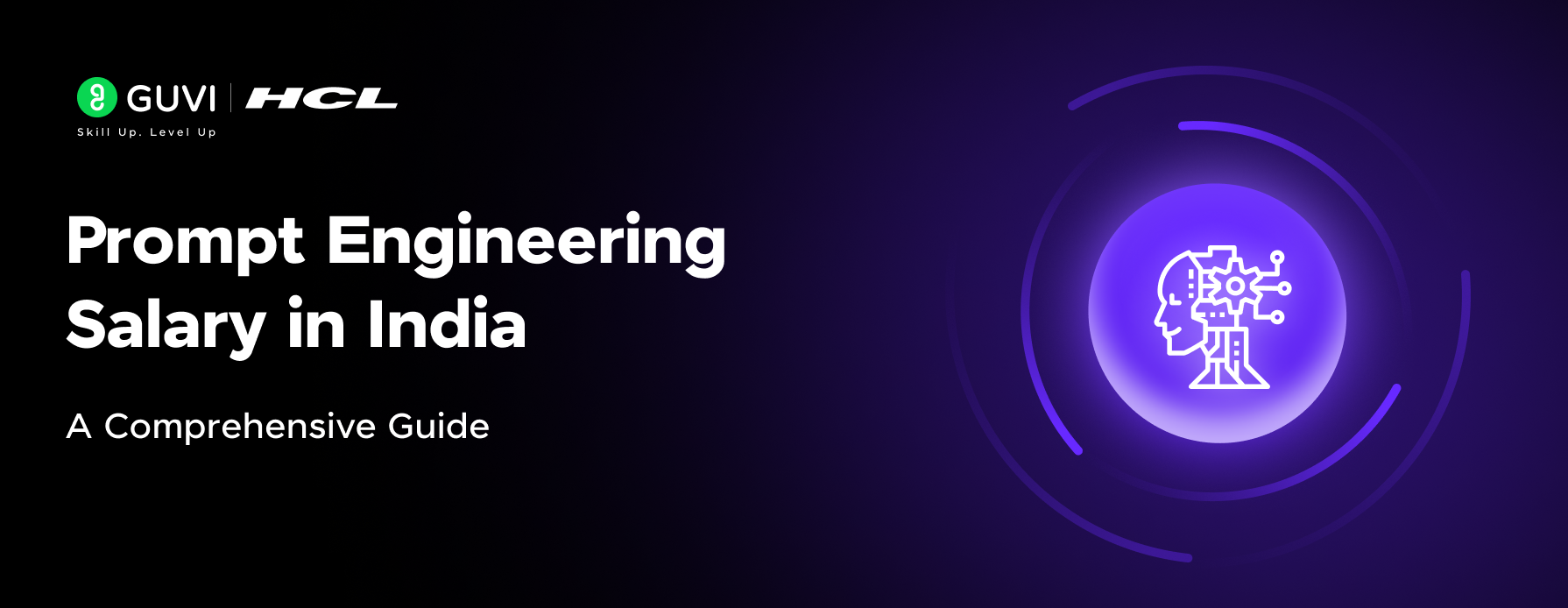
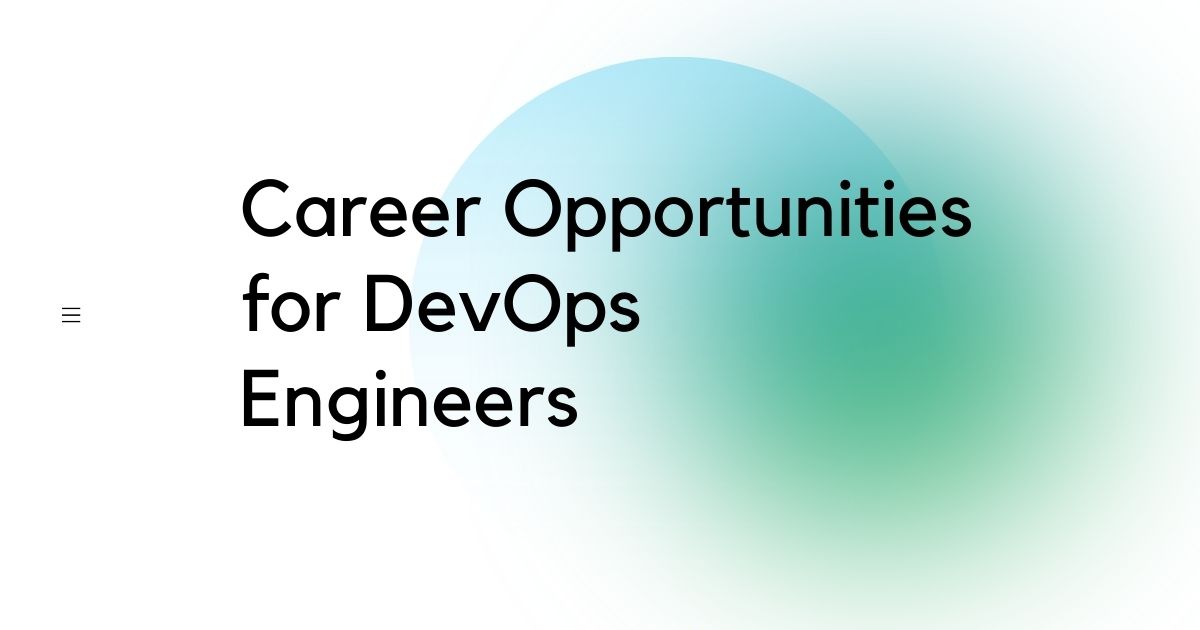


![How to Become a Robotics Engineer: A Beginner's Guide [2025] 13 robotics engineer](https://www.guvi.in/blog/wp-content/uploads/2025/05/How-to-Become-a-Robotics-Engineer.png)




Did you enjoy this article?